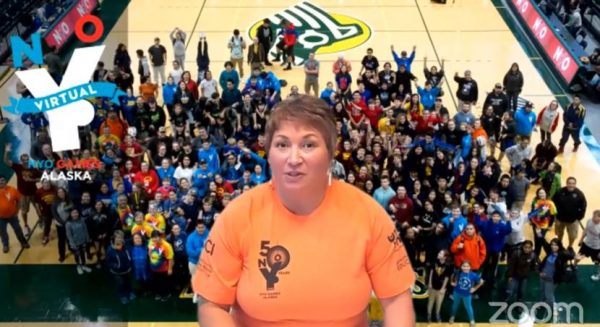
The Native Youth Olympics brings together student athletes from across the state each year to celebrate Alaska Native culture through competitive events.
Organizers canceled this year’s games due to the COVID-19 pandemic, but they found a way to continue the annual tournament that’s rooted in sportsmanship and survival.
Instead of meeting at the Alaska Airlines Center in Anchorage this year, teams sent in videos of athletes competing in their events. Coaches submitted scorecards and judges reviewed the submissions. The winners were announced Friday during a virtual awards ceremony.
Get the latest coverage of the coronavirus in Alaska
“We had over 50 athletes from over 20 communities compete from as far north as Nunamiut, as far west as Nome and as far south as Unalaska and Juneau,” said head official Nicole Johnston on Facebook Live. “Nearly every region in the state was represented.”
Johnston said athletes competed outside on beaches and driveways, inside community centers and from their living rooms.
SEE ALSO: Pandemic stirs greater demand for local meat and produce as Alaskans head into summer
Juneau athlete Ezra Elisoff, a junior at Thunder Mountain High School, placed first among boys in the Alaskan High Kick with a height of 84 inches.
The event requires balance and strength as athletes try to kick a small seal skin ball dangling from a string above them.
“The thing is, you don’t really need fancy equipment,” Elisoff said. “All you need is just a kicking ball and a nice place to yourself.”

Several other Juneau athletes placed in other events. Elisoff and his teammates trained after school throughout the school year.
Though he said it was disappointing to have the in-person event canceled, he’s just glad he got to compete — even if he won’t get to celebrate his victory with his team.
Competitors in Native Youth Olympics build each other up throughout the event. Elisoff said in other sports — like high school wrestling — you don’t see that.
“It’s different because you’re encouraged to help others and you’re encouraged to encourage each other and cheer each other on because that’s kind of what kept our ancestors alive, you know, all those years ago,” he said. “So I’m kind of proud to say that this is part of my culture.”
Native games extend outside of Alaska. Youth and adults regularly compete in similar events against athletes from as far away as Greenland.
In March, the Arctic Winter Games in Whitehorse, Canada were abruptly canceled for the first time since 1970 due to health concerns.
The annual World Eskimo-Indian Olympics, which take place in Fairbanks in July, have also been canceled. Organizers say they hope to be able to hold an online celebration.




